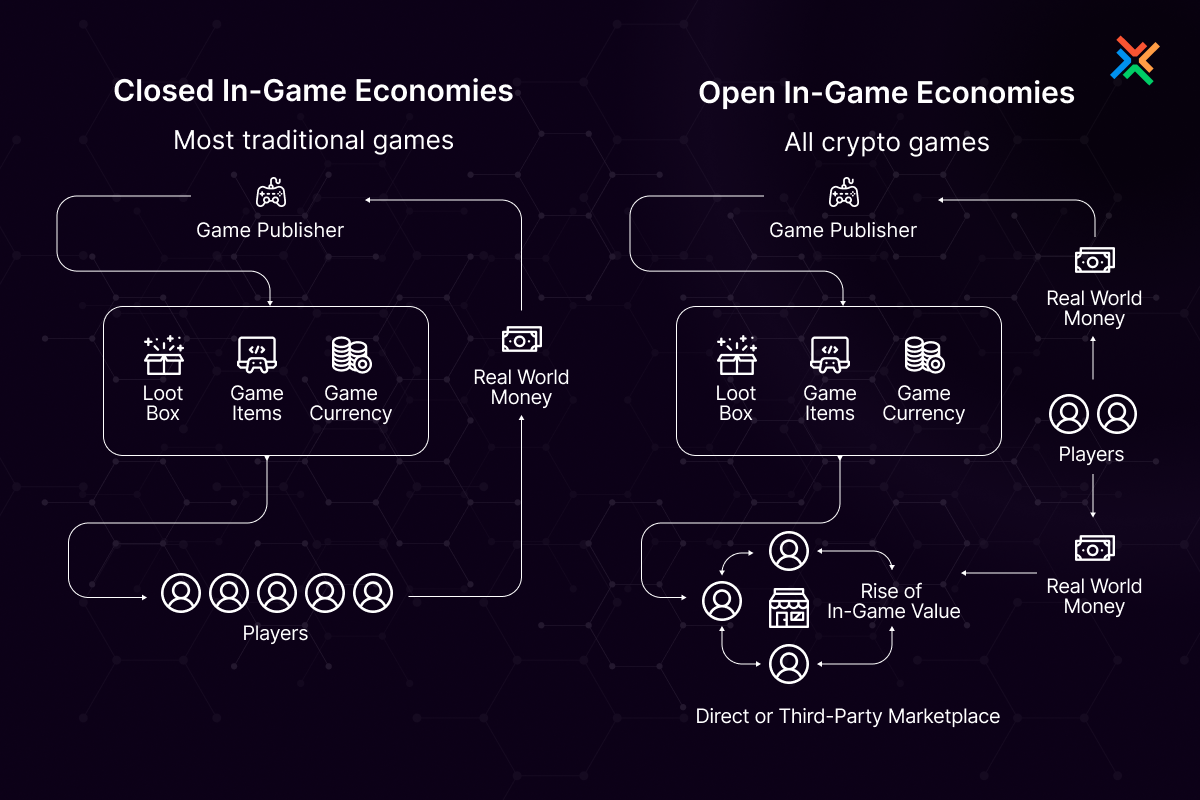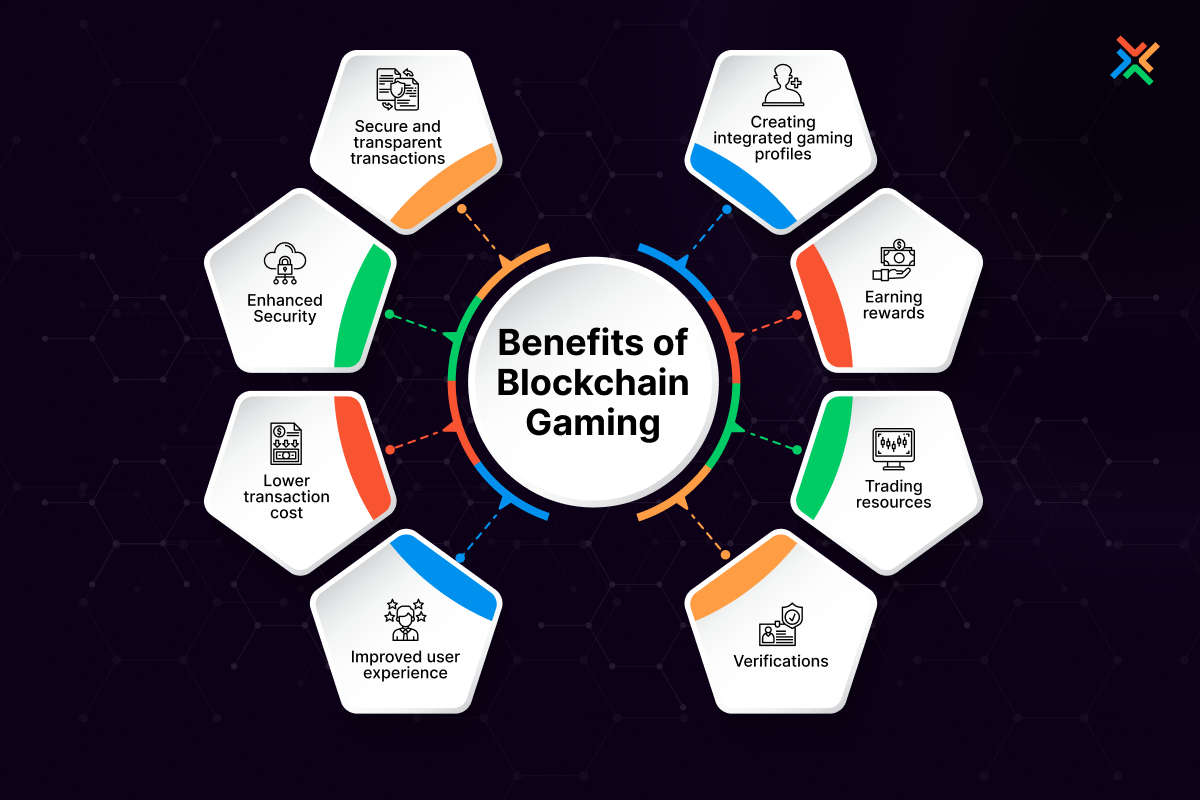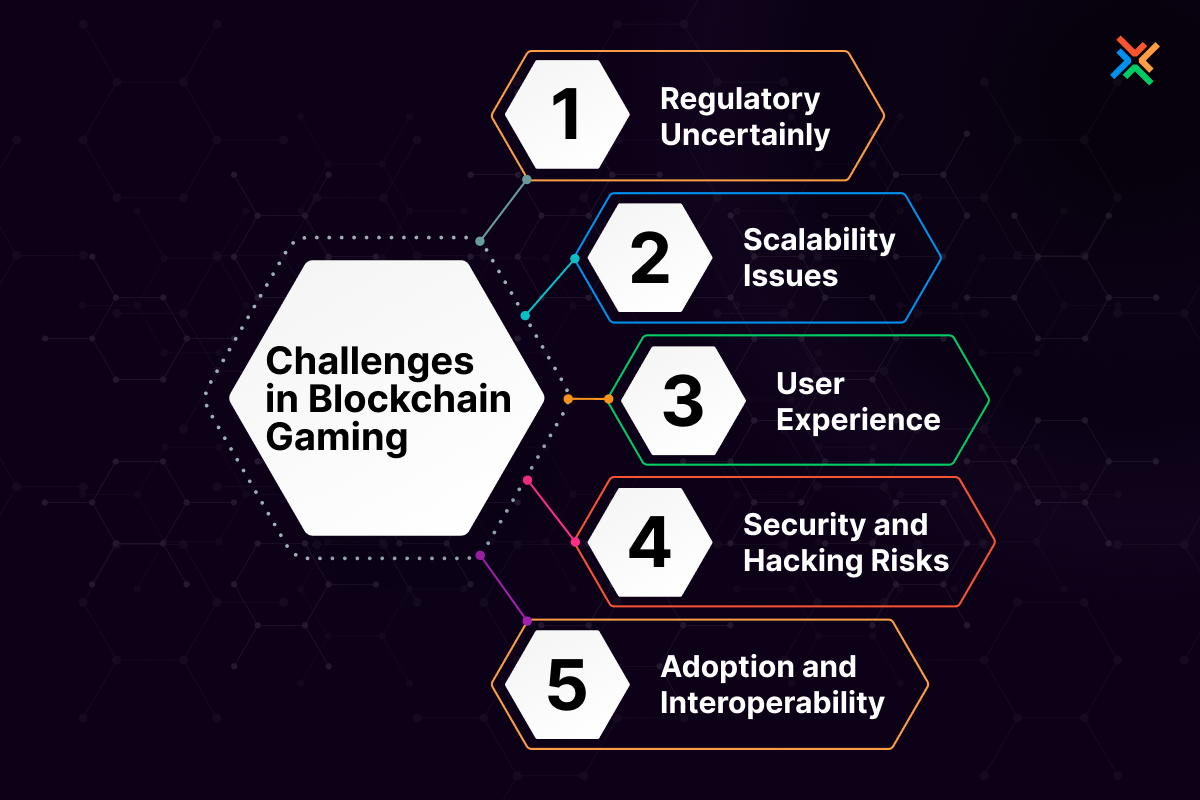Everything You Need to Know About Blockchain Gaming
March 15, 2024

Ayush Kanodia

What if we told you that the sword you wield in your favorite RPG belongs entirely to you? What if you can customize it, trade it with other players, and even potentially sell it for real-world value? All of this is possible with blockchain gaming, a revolutionary new approach that's rapidly transforming the industry.
Traditionally, gamers have poured countless hours into building virtual empires, acquiring powerful weapons, and amassing unique items. However, ownership of these digital assets has always resided solely with the game developers. This means limited control and the constant risk of losing your hard-earned in-game possessions when you move on to a new game or the servers shut down.
This is where blockchain technology steps in. Blockchain, the secure and transparent digital ledger system, is fundamentally changing the way gamers interact with virtual worlds. By integrating blockchain elements, games can offer true ownership of in-game assets. These assets are represented by NFTs (Non-Fungible Tokens), unique digital certificates that verify your ownership and allow you to freely trade them on decentralized marketplaces.
The implications are massive. Blockchain gaming opens doors to a future where players can truly own the fruits of their virtual labor. This "play-to-earn" model incentivizes engagement, creates a sense of community, and empowers players in ways never before possible.
The United Arab Emirates (UAE), a region renowned for its focus on innovation, is experiencing a surge in demand for blockchain game development services. It is poised to become a significant player in the future of gaming.
Understanding Blockchain Gaming
Traditional gaming operates within a centralized framework. Game developers hold complete control over in-game assets, dictating their creation, distribution, and value. This often leads to limitations for players.
Lack of Ownership
Players invest time and resources acquiring in-game items but ultimately have no real claim to them. These items exist solely within the game’s ecosystem and hold no value outside it.
Limited Control
Developers can modify or even remove in-game items at their discretion, potentially rendering a player’s investment obsolete.
Restricted Trading
Traditionally, trading in-game items is often restricted to specific platforms or marketplaces controlled by the developer, limiting options and potential value.
Blockchain gaming disrupts this traditional model by introducing a decentralized approach.
Blockchain technology facilitates a shift from centralized control to a more distributed system. Smart contracts, self-executing code stored on the blockchain, govern the creation, distribution, and ownership of in-game assets. This creates a more transparent and autonomous environment.
Addressing the limitations of traditional gaming, blockchain offers key features that redefine the player experience.
Play-to-Earn Model
Blockchain games often implement a "play-to-earn" model, where players can actively earn cryptocurrency or other digital assets through gameplay. This incentivizes participation and allows players to convert their in-game achievements into real-world value.
Metaverse Integration
The concept of the metaverse refers to a network of interconnected virtual worlds where users can interact, socialize, and participate in a shared digital experience. Blockchain plays a crucial role in facilitating the metaverse by allowing for the creation of in-game economies where players can own virtual land, items, and even avatars as NFTs. This creates a sense of true ownership and opens doors for new forms of value creation within the metaverse. Furthermore, blockchain technology can allow players to move their NFTs across different metaverse experiences, creating a more unified and interconnected virtual world.
NFT Ownership
In-game items become NFTs, unique digital tokens representing ownership on the blockchain. This grants players true possession of their virtual assets, allowing them to freely trade them on decentralized marketplaces for potential real-world value.
Decentralized Marketplaces
Blockchain games often leverage decentralized marketplaces where players can freely trade their NFT-based in-game items. This eliminates restrictions imposed by centralized platforms and creates a more open and competitive market.
Enhanced Security and Transparency
The underlying blockchain technology ensures the authenticity and immutability of in-game assets. Transactions are recorded on a public ledger, providing complete transparency and significantly reducing the risk of fraud or manipulation.
By addressing these limitations and introducing innovative features, blockchain gaming offers a more rewarding and empowering experience for players. This leads to a sense of true ownership and revolutionizing the way we interact with virtual worlds.

Technology Powering Blockchain Gaming
Understanding the inner workings of blockchain gaming reveals a fascinating interplay between and innovation.
Smart Contracts
At the core of blockchain gaming lies the concept of smart contracts. These self-executing code snippets reside on the blockchain and dictate the rules governing in-game processes.
Smart contracts facilitate secure and trustless transactions within the game. When a player fulfills specific criteria (e.g., winning a battle), the smart contract automatically executes the pre-programmed reward distribution. This eliminates the need for manual intervention and ensures transparent execution based on predefined conditions.
Smart contracts play a crucial role in automating in-game transactions. They facilitate secure and trustless peer-to-peer exchanges of in-game assets (NFTs) between players. Furthermore, the immutable nature of smart contracts guarantees that the rules of the game remain transparent and unalterable. This leads to a more secure and predictable environment for players.
Blockchain Platforms
Several popular blockchain platforms serve as the foundation for building innovative blockchain games.
Ethereum
A pioneer in the blockchain space, Ethereum offers a robust development environment and a large community of developers, making it a popular choice for building decentralized applications (dApps) like blockchain games.
EOS
Known for its high transaction speed and scalability, EOS caters well to games requiring faster processing of in-game actions.
Technical Considerations for Game Developers
While the possibilities are immense, blockchain game development presents unique technical challenges.
- Security Considerations: While blockchain offers inherent security through cryptography, vulnerabilities can still exist within smart contracts. Implementing robust security audits and best practices is crucial to safeguard player assets and prevent exploits.
- Scalability Challenges: Current blockchain platforms can struggle with high transaction volumes experienced in popular games. Developers need to explore innovative solutions like layer-2 scaling technologies to ensure smooth gameplay and avoid bottlenecks.
WDCS Technology possesses a deep understanding of these technical intricacies and is well-equipped to assist developers in addressing them. Our blockchain development services in UAE leverage the latest advancements in the field, ensuring robust security measures and scalable solutions customized to the specific needs of your game.
This technical expertise, coupled with our commitment to innovation, allows us to help game developers bring their next-generation gaming concepts to life on the blockchain.
Benefits of Blockchain Gaming
Blockchain gaming offers a transformative experience for both gamers and developers. Let's look into the advantages that set this technology apart.

For Gamers
True Ownership and Control
Blockchain empowers players with verifiable ownership of their in-game assets. These assets exist as unique digital tokens, which players can freely trade on decentralized marketplaces and potentially earn real-world value.
Enhanced Security and Transparency
The immutable nature of blockchain technology ensures the secure storage and tracking of in-game items. Every transaction is permanently recorded, which eliminates the risk of fraud or manipulation. This nurtures trust within the gaming ecosystem.
Frictionless Transactions
Blockchain facilitates secure and frictionless transactions. Players can buy, sell, or trade their in-game assets without relying on centralized authorities, reducing wait times and potential fees.
Evolving Economies and Earning Potential
The "play-to-earn" model incentivizes players by allowing them to earn cryptocurrency or tokens through gameplay. This injects a new layer of value and reward into the gaming experience.
Building a Unified Gaming Identity
Blockchain technology facilitates the creation of portable gaming profiles. Players can carry their accomplishments and virtual assets across different games in a secure and hassle-free manner. This creates a more unified and personalized gaming experience.
Open and Verifiable Gameplay
Blockchain promotes transparency within the game. The underlying code and mechanics become auditable, boosting trust and potentially reducing instances of unfair practices.
For Game Developers
Diversifying Revenue Streams
Blockchain technology opens up new avenues for game developers to generate revenue. In-game asset sales, marketplace fees, and the potential for integrating their own tokens within the game's economy present exciting possibilities for financial growth.
Building a Stronger Community
Blockchain offers a more engaged player base. The potential for real-world value tied to in-game assets incentivizes deeper engagement and participation. This leads to a more vibrant and loyal player community.
Exploring Innovative Features
Blockchain technology opens doors for exciting new features. Developers can utilize NFTs and smart contracts to create unique gameplay mechanics, fostering a more immersive and interactive gaming experience.
Examples of Popular Blockchain Games
The intersection of blockchain technology and gaming has brought forth a wave of innovation, altering how players interact with the virtual world. To truly grasp the transformative potential of this space, let’s explore a few prominent examples that showcase the diverse applications of blockchain technology across various gaming genres.
Axie Infinity (RPG)
This monster-collecting and battling game allows players to capture, breed, and trade unique Axie NFTs. Axies hold real-world value and can be used in battles to earn Smooth Love Potions (SLP), the game's cryptocurrency. Players can then sell SLP for fiat currency, creating a true play-to-earn experience.
CryptoKitties (Casual)
This game introduces the concept of "breedable" digital pets. Players can purchase, collect, and breed unique CryptoKitty NFTs, each with distinct characteristics and varying degrees of rarity. The ownership and potential value proposition of these digital companions highlight the possibilities of blockchain technology in casual gaming.
Decentraland (Metaverse)
This open-world experience allows users to purchase virtual land parcels as NFTs. Owners have complete control over their land, as they can build structures, host events, and even develop their own games within their plots. The game leverages blockchain to guarantee ownership and foster a thriving player-driven economy within Decentraland.
Gods Unchained (Strategy)
This strategic card game features collectible cards as tradable NFTs. Players can build decks, compete in battles, and earn rewards in the form of the game's token, GODS. The ownership of these cards allows players to participate in the game's governance and influence future development decisions.
FIFAcoins4Sale (Sports)
While not directly a game itself, FIFAcoins4Sale exemplifies the influence of blockchain technology on traditional gaming ecosystems. This platform facilitates the peer-to-peer trading of in-game items like FIFA coins using cryptocurrency. This demonstrates how blockchain can potentially revolutionize virtual economies within existing games.
Challenges and Risks
While Blockchain gaming presents exciting possibilities, acknowledging the current hurdles is crucial for a balanced perspective.

Technical Challenges
- Scalability:
Current blockchain platforms can struggle with high transaction volumes experienced in popular games. This can lead to network congestion, slow processing times, and a less-than-ideal user experience. Developers need to explore innovative solutions like layer-2 scaling technologies to ensure smooth gameplay. - Environmental Impact:
The energy consumption associated with certain blockchain protocols, particularly Proof-of-Work, raises environmental concerns. Sustainable alternatives like Proof-of-Stake are gaining traction, but addressing the environmental footprint of blockchain technology remains an ongoing effort.
Market Volatility
The cryptocurrency market is inherently volatile, and this can directly impact the value of in-game assets (NFTs). Fluctuations can lead to uncertainty for players and pose a potential risk to the overall stability of the play-to-earn model.
Game Design Considerations
Blockchain gaming can lead to prioritizing Play-to-Earn over Gameplay The focus on earning rewards through in-game activities can overshadow the core gameplay experience. This could lead to situations where repetitive tasks and grinding become the primary motivator, compromising the overall enjoyment of the game.
Interoperability Challenges
Currently, in-game assets often exist within isolated ecosystems of individual games. Limited interoperability between blockchain games restricts the potential for players to freely move their NFTs across different virtual worlds, hindering a sense of broader usability and value.
Potential for Scams
As with any new technology, the space may attract fraudulent practices. Malicious actors could exploit vulnerabilities to steal player assets or engage in misleading schemes. Furthermore, phishing scams, fake game projects, and fraudulent practices pose a threat to players. Exercising caution, conducting thorough research, and only interacting with reputable entities are crucial measures for mitigating these risks.
Despite these challenges, the industry is actively working towards solutions. Developers are exploring ways to optimize scalability, environmental impact is being addressed through the adoption of greener protocols, and efforts are underway to facilitate greater interoperability between blockchain games.
The Future of Blockchain Gaming
The future of blockchain gaming shimmers with immense promise. As the technology matures and the industry tackles current challenges, we can expect to witness pretty exciting developments.
Mainstream Adoption
Major gaming companies are actively exploring the potential of blockchain technology. This increased industry interest suggests a future where blockchain integration becomes more commonplace, leading to wider adoption and a broader audience for blockchain-powered games.
Evolving Experiences
The capabilities of blockchain games are not limited to facilitating ownership of in-game assets. Developers will harness this technology to craft entirely new and innovative gaming experiences. The possibilities are boundless; for instance, it is possible to create games where virtual worlds seamlessly blend with real-world economies, or where players co-own and contribute to the ongoing development of the game itself.
Metaverse Integration
The concept of the Metaverse, a network of interconnected virtual worlds, aligns perfectly with the vision of blockchain gaming. Blockchain's ability to facilitate secure ownership and efficient asset transfer across platforms leads to a truly immersive and interconnected metaverse experience. Players can move their cherished in-game possessions and avatars across different virtual environments, creating a deeper sense of digital identity and continuity within the metaverse.
Regulatory Considerations
As the blockchain gaming space grows, regulatory frameworks will need to adapt to address potential issues and ensure consumer protection. The industry will likely see the development of regulations aimed at protecting players from fraudulent practices and ensuring fair market conditions within the virtual economies of blockchain games.
Getting Started with Blockchain Game Development
Blockchain gaming presents an exciting opportunity for those with innovative ideas. For experienced blockchain developers UAE and entrepreneurs who are eager to grab it, here’s a roadmap to guide you through the initial stages of development.
Concept Ideation and Game Design
It all begins with a well-defined concept and captivating game design. Define the in-game assets and carefully craft the core gameplay mechanics, narrative, and overall player experience, ensuring they align with the potential of blockchain technology.
Platform Selection and Development Tools
Choosing the right blockchain platform is crucial. Factors like transaction speed and scalability need to be considered. Popular options include Ethereum, Polygon, and EOS, each with its own strengths and limitations. Also explore the available development tools and frameworks that cater to blockchain game creation.
Smart Contract & NFT Integration
Smart contracts are the engine that powers the in-game economy. Your development team will need to meticulously design and integrate secure smart contracts to govern transactions, ownership, and other core functionalities within the game. NFT functionality is then embedded to represent in-game assets as unique digital tokens.
Testing and Deployment
Rigorous testing is vital. Ensure your game undergoes comprehensive testing to identify and rectify any potential bugs or vulnerabilities before deployment. Once satisfied, the game is deployed onto the chosen blockchain network, ready to be experienced by players.
How WDCS Technology Can Help You with Blockchain Game Development
At WDCS Technology, we are equipped to realize your vision with our expertise in blockchain app development services in UAE. Our team of passionate developers brings a wealth of experience to the table in utilizing their expertise for crafting solutions pertaining to the gaming industry.
Custom Blockchain Solutions
As a custom blockchain solutions company UAE, we don't believe in a one-size-fits-all approach. Our team can craft bespoke blockchain solutions that cater to the unique requirements of your game concept.
Smart Contract Development
Security considerations are crucial. Our developers have the expertise to design and implement secure and scalable smart contracts that form the backbone of your in-game economy.
NFT-Integration and Marketplace Creation
We understand the essence of ownership. We can integrate NFT functionality into your game and even assist in crafting a thriving marketplace for players to trade their virtual assets.
At WDCS Technology, we are passionate about the transformative potential of blockchain technology in gaming. We are here to guide you every step of the way, from ideation to deployment. Contact us today for a consultation and let's discuss how we can turn your vision into an innovative and exciting blockchain game.
Develop a blockchain-based game that empowers your users.
Blockchain games are rapidly gaining traction and if you're looking to develop one, WDCS can help. Our team of experts will work with you to create an exciting, engaging, and high-yielding game based on a play-to-earn model.